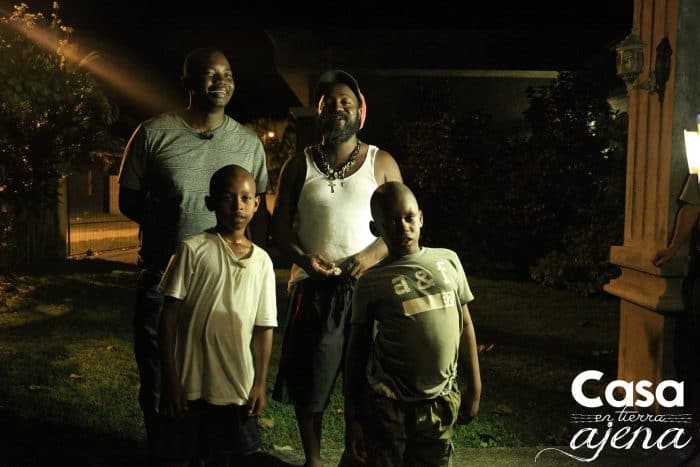Waves of Central American migration toward the United States have been increasing during the past decade, but the root causes are often misunderstood. To tell the untold stories of the region’s migrants, the team behind the new Costa Rican documentary “Casa en Tierra Ajena” (“Home in a Foreign Land”) traveled 4,200 km and visited more than 40 different locations in Honduras, El Salvador, Guatemala and Mexico.
The film, produced by the University of Costa Rica (UCR) and the State University at a Distance (UNED), and financed by the National Council of University Rectors’ (CONARE), focuses on people who have been forced to flee their countries because of increased unemployment, poverty, and violence in the region.
Take a look at our overview of the film:
The film was inspired by the work of UCR researcher Carlos Sandoval. His 2013 book “Exclusion and Forced Migration in Central America” (now available in English) eventually led him to the filming and production of “Casa en Tierra Ajena” with communicator and producer Ivannia Villalobos and the rest of the team in 2014 and 2015.
During a recent interview at the UCR’s Social Research Institute, Villalobos told The Tico Times the documentary is divided into three sections. “The right not to migrate” focuses on root causes of migration, such as gang violence; “the right to have rights” focuses on the dangers migrants face during the trip; and the final section, “the right to hope,” focuses on hope and solidarity shown by migrants.
“The structural violence that Central America lives in is characterized by unemployment and a lack of access to basic needs such as health, education and household,” Sandoval said. “Criminal violence is now added to this, which makes intentional homicide rates highly increase. For example, El Salvador, a country that has not been declared in war, is the country with the highest intentional homicide rates in the world. Some of the most violent cities in Latin America are San Pedro Sula and Tegucigalpa.”
Anti-immigration measures such as a the U.S.-Mexico border wall proposed by U.S. President Donald Trump don’t address this complex combination of structural and criminal violence, nor do they address what Sandoval points out is the role of the United States in the equation.
“Regarding criminal violence, a lot of it has to do with illicit substances that have the United States as their main market,” he explains, adding that the U.S. policy of cracking down on drug trafficking from Colombia through the Pacific through the Plan Colombia aid package, implemented in 2000, worsened Central America’s problems. “A majority of those illicit substances [now] go through the Central American territory, and many of the territorial disputes that occur in Costa Rica, El Salvador and many other countries have to do with the control of the narcomenudeo [local drug trafficking].”

Costa Rica’s Judicial Investigation Police (OIJ) estimates that between a 40% and 50% of intentional homicides are associated with drug disputes, Sandoval pointed out.
“If we didn’t have this problem in Costa Rica, we’d have fewer homicides,” he said. “It’s an interesting paradox for the U.S. audience because [Central American] migration is produced by an economic activity whose main market is the United States.”
These issues, whose urgency was heightened by the waves of Central American migrant children traveling to the United States in 2014 and increasing deportations of Central American people from the U.S. and Mexico, became the motivation for creating “Casa en Tierra Ajena,” Villalobos said.
“It’s not only about the journey, but also about profoundly addressing on what drives these people toward the forced migration,” she said. “An important element was all the investigation carried out emphasizing on the communities that are being displaced due to the extractive model [high-impact, unsustainable resource extraction]… mainly mining, hydroelectric, monoculture and hotel developments that use beaches in Garifuna communities.”
In Honduras, filmmakers visited the Observatory of Human Rights in Bajo Aguán, which is an organization responding to difficulties created by African Palm monoculture, and the community of Barra Vieja, which was displaced by the development of enormous hotels such as the Indura Resort, Villalobos explained. They also worked in Ciudad El Progreso’s Committee of Disappeared Family Members (COFAMIPRO), which is one of the organizations providing aid towards the migrants.
In Guatemala they visited the towns of Santa Cruz Varillas, which is resisting the hydroelectric project Ecoener Hidralia, and San José del Golfo, resisting the open-cast mining project La Puya.
In Costa Rica, the migration process toward the U.S. represents barely 3 percent of the population. Costa Rica has become a transit area for migrants from other Central American countries who are seeking refuge here or trying to get to the United States.
“The violence issue in Central America has increased so much, that these people ask for refugee status here. Last year the number of [asylum requests in Costa Rica] from people from El Salvador was 1,471, ” Sandoval told The Tico Times.
For Villalobos, Costa Rica is a pivotal juncture.
“We’re in a moment in which we have the challenge of becoming a Costa Rica that’ll imitate the solidarity in Mexico we were able to depict in the documentary; we can become like the Mexico in which there’s all that extortion towards migrants; or we can begin to take affirmative actions for the defense of these populations,” she said. “That’s one of the challenges that the documentary raises for Costa Rica.”
Casa en Tierra Ajena premiered officially at the Cine Magaly in San José on March 30. Later this month it’ll be uploaded to YouTube.





